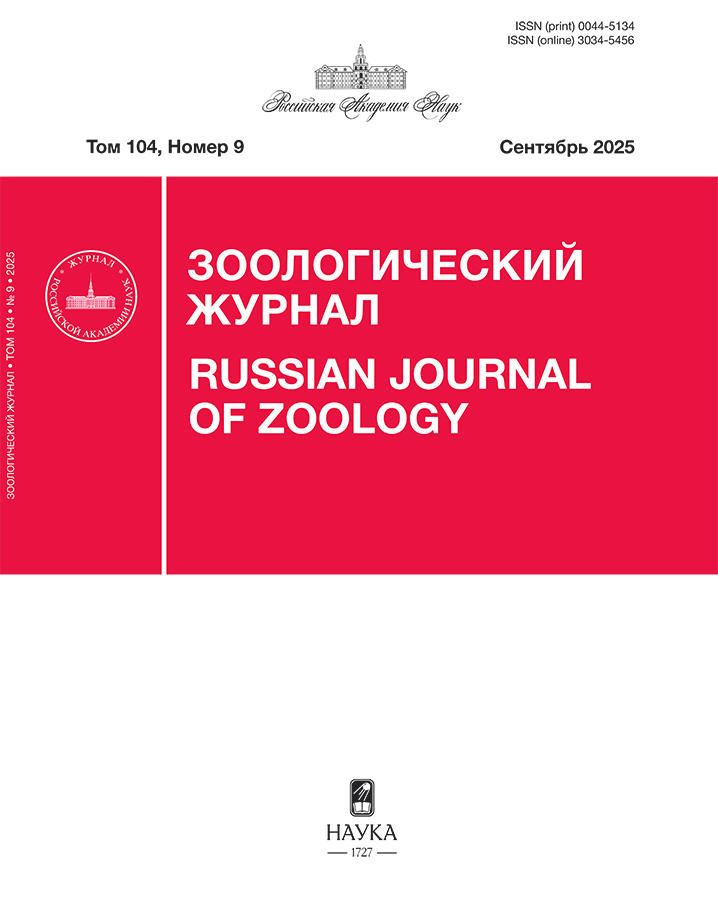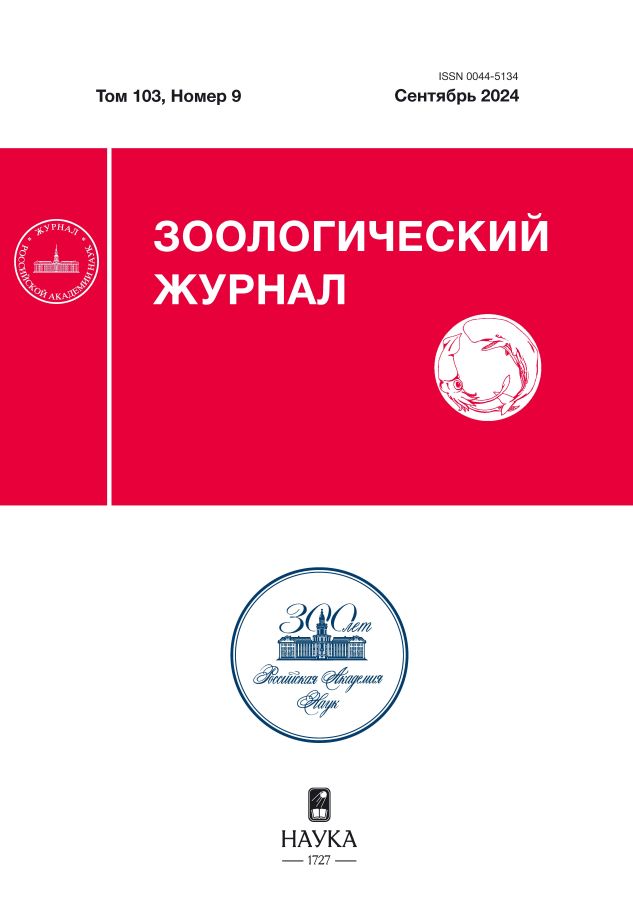Дополнения к фауне панцирных клещей (Acari, Oribatida) Вьетнама, с описанием нового вида рода Peloribates
- Авторы: Ермилов С.Г.1
-
Учреждения:
- Тюменский государственный университет
- Выпуск: Том 103, № 9 (2024)
- Страницы: 17-25
- Раздел: Статьи
- URL: https://ter-arkhiv.ru/0044-5134/article/view/654245
- DOI: https://doi.org/10.31857/S0044513424090022
- EDN: https://elibrary.ru/tsgrqw
- ID: 654245
Цитировать
Полный текст
Аннотация
Исследование базируется на орибатологическом материале, собранном в сухой подстилке в ди- птерокарповом лесу в провинции Даклак, южный Вьетнам. Представлен перечень из 51 вида, относящегося к 37 родам и 23 семействам; из них 5 видов и 2 подвида отмечены для Вьетнама впервые и два вида отмечены для Ориентальной области впервые. Описан новый вид рода Peloribates (Haplozetidae), Peloribates (Peloribates) parapalawanus sp. n. Представлены новый родовой диагноз и идентификационный ключ к известным видам рода Peloribates из Вьетнама.
Ключевые слова
Полный текст
Об авторах
С. Г. Ермилов
Тюменский государственный университет
Автор, ответственный за переписку.
Email: ermilovacari@yandex.ru
X-BIO Institute
Россия, Тюмень, 625003Список литературы
- Aoki J., 1977. Two new Peloribates species (Acari, Oribatida) collected from lichens growing on tombstones in Ichihara-shi, Central Japan // Annotationes Zoologicae Japonenses. V. 50. P. 187–190.
- Balogh J., Mahunka S., 1967. New oribatids (Acari) from Vietnam // Acta Zoologica Academiae Scientiarum Hungaricae. V. 13. P. 39–74.
- Balogh J., Mahunka S., 1981. New data to the knowledge of the oribatid fauna of the Neogaea, VI. (Acari) // Acta Zoologica Academiae Scientiarum Hungaricae. V. 27. P. 49–102.
- Berlese A., 1908. Elenco di generi e specie nuove di Acari // Redia. V. 5. P. 1–15.
- Corpuz-Raros L.A., 1981. Philippine Oribatei (Acarina). IV. The genus Peloribates Berlese (Oribatuloidea, Haplozetidae) // The Philippine Entomologist. V. 4. P. 435–456.
- Corpuz-Raros L., Ermilov S. G., 2020. Catalogue of oribatid mites (Acari: Oribatida) from Continental Southeast Asia // Zootaxa. V. 4893. P. 1–216.
- Ermilov S. G., 2015. A list of oribatid mites (Acari, Oribatida) of Vietnam // ZooKeys. № 546. P. 61–85.
- Ermilov S. G., Anichkin A. E., 2011. Two new species of Oripodoidea (Acari: Oribatida) from Vietnam // Acarologia. V. 51. P. 143–154.
- Ermilov S. G., Anichkin A. E., 2014. Taxonomic study of oribatid mites (Acari, Oribatida) of Bi Dup–Nui Ba National Park (southern Vietnam) // Zootaxa. V. 3834. P. 1–86.
- Ermilov S. G., Martens J., 2024. Two new species of Oripodoidea (Acari, Oribatida) from Nepal // Systematic and Applied Acarology. V. 29. P. 294–304.
- Ermilov S. G., Salavatulin V. A., 2022. Oribatid mites of the genus Eremaeozetes (Acari, Oribatida, Eremaeozetidae) from trees in Cat Tien National Park, Vietnam // International Journal of Acarology. V. 48. P. 510–522.
- Ermilov S. G., Salavatulin V. M., 2023. New arboreal mite species of Oribatulidae and Oripodidae (Acari, Oribatida, Oripodoidea) from Vietnam // International Journal of Acarology. V. 49. P. 283–291.
- Ermilov S. G., Starý J., 2020. Two new species of Haplozetidae (Acari: Oribatida) from Madagascar // International Journal of Acarology. V. 46. P. 146–154.
- Ermilov S. G., Shtanchaeva U.Ya., Subías L. S., 2019. Peloribates roynortoni (Acari, Oribatida, Haplozetidae), a new species of oribatid mites from the USA // Acarina. V. 27. P. 3–9.
- Ermilov S. G., Subías L. S., Shtanchaeva U.Ya., Friedrich S., 2021. New sacculonotic Oripodoidea (Acari: Oribatida) from Peru // Zootaxa. V. 5048. P. 422–434.
- Hammer M., 1972. Tahiti. Investigation on the oribatid fauna of Tahiti, and on some oribatids found on the atoll Rangiroa // Det Kongelige Danske Videnskabernes Selskab Biologiske Skrifter. V. 19. P. 1–66.
- Hammer M., 1979. Investigations on the oribatid fauna of Java // Det Kongelige Danske Videnskabernes Selskab Biologiske Skrifter. V. 22. P. 1–78.
- Kim J., Bayartogtokh B., Jung C., 2016. A new record of Peloribates barbatus Aoki, 1977 (Oribatida: Haplozetidae) from Korea // Journal of Species Research. V. 5. P. 364–367.
- Mahunka S., 1988. A survey of the Oribatid Fauna (Acari) of Vietnam, II // Acta Zoologica Hungarica. V. 34. P. 215–246.
- Mahunka S., 1988a. New and interesting mites from the Geneva Museum LXI. Oribatids from Sabah (East Malaysia) III (Acari: Oribatida) // Revue suisse de Zoologie. V. 95. P. 817–888.
- Mahunka S., 2011. New and little known oribatid mites from Madagascar (Acari: Oribatida), III // Opuscula Zoologica Budapest. V. 42. P. 43–66.
- Norton R. A., 1977. A review of F. Grandjean’s system of leg chaetotaxy in the Oribatei (Acari) and its application to the family Damaeidae // In: Dindal D. L., editor. Biology of oribatid mites. Syracuse: SUNY College of Environmental Science and Forestry. P. 33–61.
- Norton R. A., Behan-Pelletier V.M., 2009. Oribatida // A Manual of Acarology (TX). Lubbock: Texas Tech University Press. P. 430–564.
- Salavatulin V. M., Ermilov S. G., Kudrin A. A., Nguyen T. D., 2022. Initial data on arboreal oribatid mites (Acari, Oribatida) from Vietnam // Acarina. V. 30. P. 103–108.
- Subías L. S., 2022. Listado sistemático, sinonímico y biogeográfico de los ácaros oribátidos (Acariformes: Oribatida) del mundo (excepto fósiles) // Monografías Electrónicas Sociedad Entomológica Aragonesa. № 12. P. 1–538.
- Subías L. S., 2023. Listado sistemático, sinonímico y biogeográfico de los ácaros oribátidos (Acariformes: Oribatida) del mundo (excepto fósiles), 18a actualización. P. 1–540. Available from: http://bba.bioucm.es/cont/docs/RO_1.pdf (accessed February 2023).
Дополнительные файлы
Доп. файлы
Действие
1.
JATS XML
2.
Рис. 1. Peloribates (Peloribates) parapalawanus Ermilov sp. n., взрослая особь (ноги и некоторые нотогастральные щетинки не показаны): а – вид сверху, б – вид снизу, в – вид справа сбоку. Масштабная линейка 100 мкм.
Скачать (701KB)
3.
Рис. 2. Peloribates (Peloribates) parapalawanus Ermilov sp. n., взрослая особь: а – вид сзади (часть левой половины не показана); б – передняя часть продорсума, вид спереди; в – нога I, правая, вид с антиаксиальной стороны; г – нога II (вертлуг и цевка не показаны), левая, вид с антиаксиальной стороны; д – нога III (цевка не показана), правая, вид с антиаксиальной стороны; е – нога IV, правая, вид с антиаксиальной стороны. Масштабные линейки, мкм: а – 100, б – 20, в–е – 50.
Скачать (752KB)













